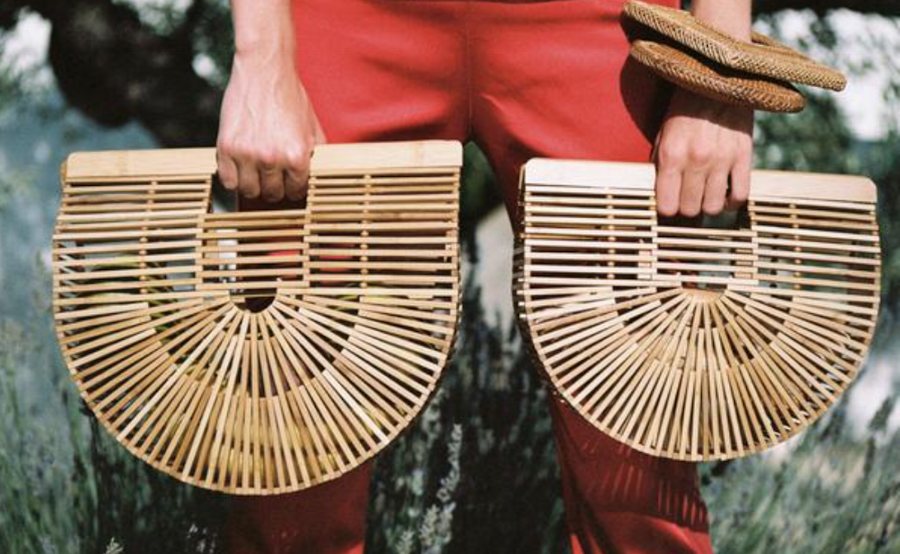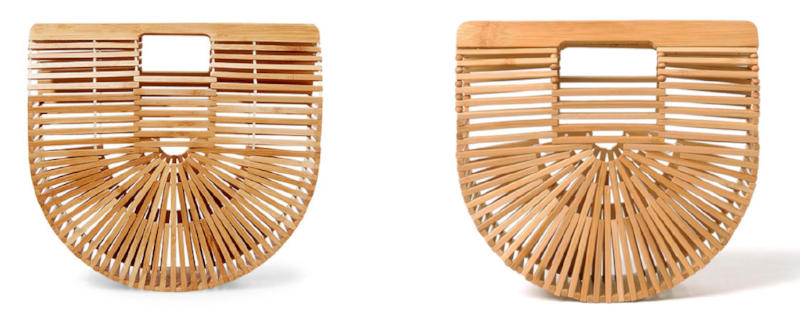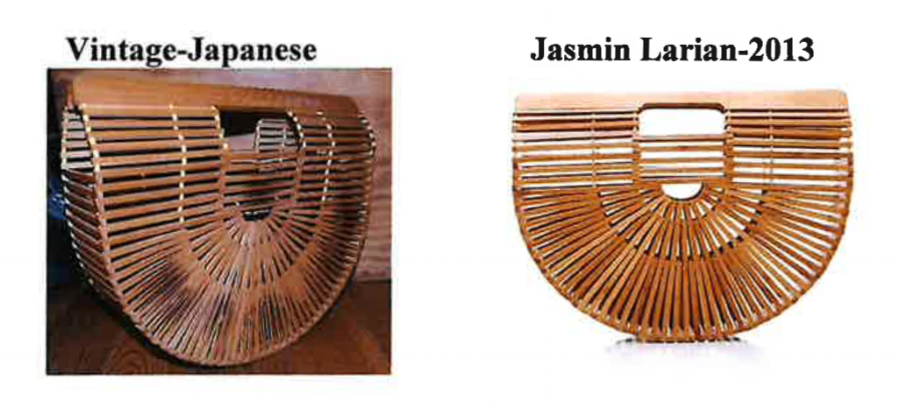
image: Cult Gaia
Steve Madden is calling foul on that crescent-shaped bamboo bag that was likely all over your Instagram feed last summer and the brand that is responsible for its recent surge in popularity. It turns out, Cult Gaia founder Jasmin Larian – one of fashion (and Instagram)’s favorite emerging accessories designers – enlisted counsel last month in an attempt to stop New York-based footwear/accessories giant Steve Madden, Ltd. “(Madden”) from “infringing” its best-known bag, its bamboo Ark bag, by way of Madden’s own version, the BShipper bag. And Steve Madden is not having it.
According to Madden, it received a letter on February 18 from an attorney for Larian and her Los Angeles-based “it” brand, demanding that Madden “[i]mmediately and permanently cease and desist from any further sale, distribution, promotion, and/or advertisement of any item that infringes upon the Ark trade dress” and “destroy all infringing items and confirm destruction of the same, “and “cancel any outstanding orders/backorders to manufacturer(s), wholesaler(s), and/or importer(s) of the infringing items.”
Steve Madden decided to fight back and filed suit against Larian’s limited liability company, Jasmin Larian, LLC, in New York federal court.

Madden’s Shipper bag (left) & Cult Gaia’s Ark bag (right)
In its complaint (one that serves as a rather timely comment on the oft-context-less claims of “copying” that have taken over the fashion industry), Madden takes issue with Larian’s rights in its famed bamboo clutch. To be exact, Madden claims that instead of actually creating an original bag, Larian’s “Cult Gaia Ark bag slavishly copies the traditional Japanese bamboo picnic bag design.”
Not only are Larian and Cult Gaia passing off the bag as its own original creation, says Madden, it is in the process of attempting to claim exclusive legal rights in the design. In July 2017, “Jasmin Larian filed with the United States Patent and Trademark Office (‘USPTO’) a [trade dress] application to register the design of the Ark bag.” The application, according to Madden, represents Larian and Cult Gaia’s “attempt to appropriate the Traditional Japanese Design for itself.”
(Note: Trade dress is a type of trademark protection that applies to the configuration (design and shape) of a product itself, or in other words, “the total image of a product,” including “features such as size, shape, color or color combinations.” In much the same way as trademark holders need not be the first to ever use a mark (others were using the word “apple” before the tech giant, the key inquiry in terms of trade dress considerations is whether the average consumers associated the trade dress (the Ark bag in our case) with the brand that makes it, Cult Gaia here. That will likely be a tough case to make, in part because so many others, including countless Amazon sellers and vintage Japanese brands, have been using the design for years).
As Madden correctly points out, the USPTO has some doubts about the merits of Larian’s application, and responded in October 2017 by issuing an office action, a letter sent by the USPTO notifying the applicant that his/her mark is not registrable. In the instance at hand, the USPTO held that Larian’s bag design is not eligible for protection because it “is merely an iteration or appropriation of a style of bag from the Japanese culture,” that the “design is a classic shape and style of carrying bag for personal use.”

While applicants have six months respond to a USPTO office action and try to prove the merit of their trademark or trade dress, Larian’s counsel has not (yet) done so.
Madden uses the USPTO’s response to bolster its argument that Larian lacks rights in the bag and thus, does not have grounds to threaten or purse legal action against anyone or any brand for “copying.”
With that in mind, Madden is asking the court – as part of its declaratory judgment action – to declare that Larian’s design is not subject to trade dress protection because the design, itself, is “functional,” “generic,” and “ubiquitous” (all of which serve as bars to registrability) and thus, that its own bag, the BShipper, does not infringe Larian’s rights. In short: Madden wants to ensure that Larian’s trade dress application is denied (once and for all) and as a result, she be officially stripped of any grounds to sue the Steve Madden brand.
Oh, and Madden wants Larian to foot its legal bill for it having to file this lawsuit in the first place.
Counsel for Cult Gaia, Aaron M. Wais of Mitchell Silberberg & Krupp LLP, said in a statement to TFL, “Cult Gaia is an emerging brand in the women’s contemporary ready-to-wear and accessories space, founded by the creativity and original designs of Jasmin Larian … We believe it is our duty to protect our hard-earned intellectual property assets on behalf of our retail partners – and customers who shop our website directly. We will address Steve Madden’s lawsuit in due course but it is our practice to take proper legal channels to protect our brand as the law permits.”
* The case is Steve Madden, Ltd., vs. Jasmin Larian, LLC, 1:18-cv-02043 (SDNY).







